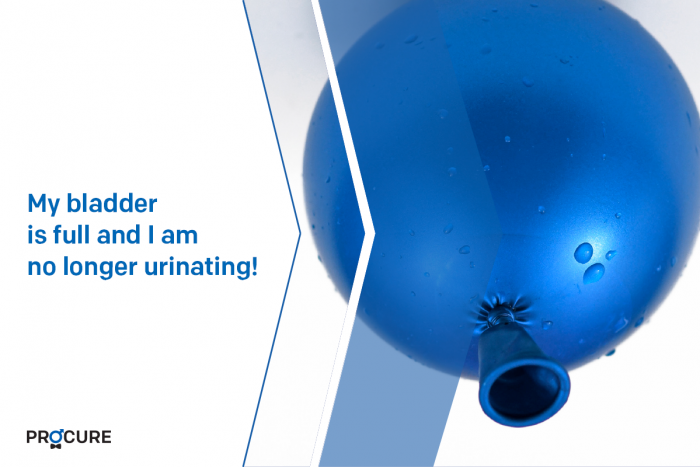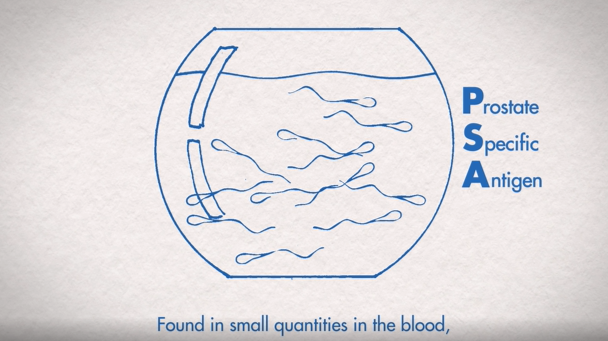A sudden and painful inability to voluntarily empty the bladder suggests acute urinary retention. My bladder is full and I am no longer urinating means consult urgently! It is more common in men than women and is most often due to an enlarged prostate or BPH. The latter can compress the urethra, to the point where men cannot urinate at all.
You will know that you are having a urinary blockage because of the symptoms. In such cases, your bladder tightens very painfully for a few hours as it fills with urine and swelling of the lower abdomen occurs. Showers, hot baths, a hot water bottle on your stomach are of no use.
If you cannot urinate at all, go to the emergency. The first treatment is to immediately relieve your bladder by inserting a catheter to evacuate the overflow of urine. The doctor will then look for the cause of this blockage.
Other common causes of urinary obstructions include stenosis (narrowing caused by scar tissue) of the ureter or urethra following radiation therapy, surgery or other procedures performed on the urinary tract.
Urinary blockage is normally preceded by symptoms of urinary retention. Let’s take a closer look.
Symptoms of urinary retention
The main symptom of urinary retention is difficulty passing urine. The urine stream is very weak, and you sometimes have to press on your bladder to pass urine. After urination, the bladder seems not to be completely emptied. Pain in the lower abdomen is common.
Diagnosis of urinary retention
If you are unable to urinate, the diagnosis is clear.
In other cases, the doctor will try to see how much urine is left in your bladder after you urinate as much as possible. If this volume is more than about 120 milliliters (a little more in the elderly), urinary retention is diagnosed.
Your doctor will do a physical exam, usually including a digital rectal exam, which can tell if your prostate is enlarged. He may take a urine sample to check for infection. Blood tests and imaging tests may be necessary to determine the cause of urinary retention.
Be aware that in rare cases, retention can also be linked to severe constipation. Hard stools trapped in the rectum will compress the urinary tract and make urination impossible.
And its treatment?
Medicines that can cause urinary retention are stopped when possible. In the presence of an enlarged prostate, prostate surgery or drugs to decrease the size of the prostate or that relax the muscles of the bladder neck may be recommended. In addition to emollients or powders to counter constipation.
People with nerve problems that interfere with the signals between the brain and the bladder indicating that the bladder is full may need to use a catheter themselves occasionally or at all times.
You have to learn to ask your doctor the right questions:
- How long do I have to have this urinary catheter?
- What do you mean by lazy bladder?
- What changes should I make to my lifestyle?
- Can I opt for surgery to avoid medication?
Discover our new animated videos
Discover three new animated videos, each equally unique and original from one to the other. Be on the lookout!
Here is the first one – Symptoms, Risk and Screening
Take the time to visit each of our pages on this website, as well as our YouTube channel, in order to get familiar with the disease with our expert lectures, our section on available resources, the support that is offered to you.
Do you have any questions or concerns? Above all, do not hesitate. Contact us at 1 855 899-2873 to discuss with a nurse specializing in uro-oncology. It’s simple and free, like all our services.
Pages of our site that might interest you
Want to know more? Just click on the link below.
Recognize the signs and symptoms
Prostate-related diseases
PROCURE news that may interest you
Each week, we publish a blog article. Here are a few for you.
Do you have a urinary catheter? Here’s how to take care of it
Do your medications cause urinary incontinence?
Better manage stress to reduce symptoms of BPH
Written by PROCURE. © All rights reserved – 2021



 ADDITIONAL RESOURCES
ADDITIONAL RESOURCES


